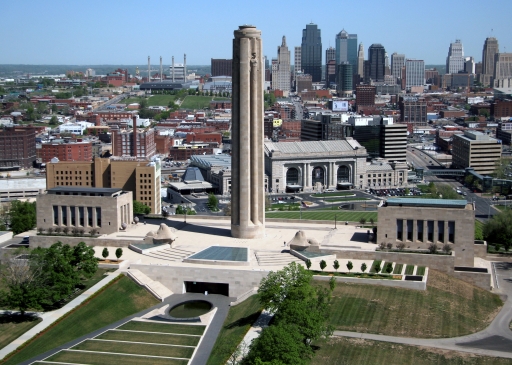Article by Centenary News’s Nigel Dacre on the Great War conference held at the National World War I Museum at Liberty Memorial, Kansas City, Missouri, in March 2013.
The main point coming out of the Great War conference held in Kansas City was that with just over a year to the start of the Centenary there are strikingly different levels of preparation around the world.
At one end of the scale is the Flemish Government, who have a clear strategy for the next 5 years. Towards the other end, not surprisingly, is Germany – where one expert told the conference that “nothing is going on”. In between, the countries that participated in the war have varying levels of preparations and plans.
The conference, A Century in the Shadow of the Great War, was held from March 22nd to the 24th 2013, and was attended by more than 125 participants from seven countries.
The organisers said the event would “provide a unique opportunity for participants to conduct preliminary discussions, formulate plans and develop collaborative initiatives for the international commemoration of the 100th anniversary of World War I”.
It was held at the National World War I Museum in Kansas City, Missouri, which is housed within the Egyptian Revival style Liberty Memorial, with its imposing 66 metre tower.
Most ahead, then, is the Flemish Government – who fielded by far the largest non-American delegation to the conference, including government, heritage and tourism officials.
Dr Koen Verlaeckt, the Secretary General of the Flemish Department of Foreign Affairs, gave a step-by-step overview of what he described as “an ambitious four year-remembrance project”. It recognises that his region was the scene of much of the fighting, but also the fact that Belgium will be a major tourist and visitor destination during the Centenary years.
Their plans include a draft International Declaration, 16 specific projects for 2014-15, an international Science for Peace symposium in November 2013, and an ongoing upgrade programme for some of the key Flanders battlefield sites – including a new visitor centre at the Lijssenthoek hospital cemetery, and the renovated Yser Tower Museum in Diksmuide.
One of their projects is to transport soil from the battlefields of Flanders and set up a series of memorial gardens in other countries. The first will be officially inaugurated in London in November 2014.
In his presentation, Koen Verlaeckt said that Flanders Fields had become “a sad household name for unprecedented human suffering and material destruction”. The aim for his government was to commemorate the 100th anniversary “in a fitting and serene manner”, and he hoped that their approach would “touch hearts and elicit emotions”.
Australia also has well established plans, with the main focus around the Gallipoli anniversary of 25th April 2015.
Dr Joan Beaumont, from the Australian National University, outlined her government’s planning process. She quoted the Australian wartime Prime Minister who said that “Australia was born on the shores of Gallipoli”, and she explained how the aim was to mark the anniversary by emphasising the civic values of “courage, endurance, sacrifice and mateship”.
She said one of the main problems facing the Australian government was how to decide who would be allowed to go to the actual anniversary event itself, which will be held on North Beach at Gallipoli – and they have yet to work out whether tickets should be through first-come-first-served, a ballot, or a mixture of a ballot and representatives of relevant organisations.
One problem, apparently, is that commercial tour companies have been selling their own tickets for some time, and are now threatening to hold a rival ceremony on a nearby beach. Another concern is that a flotilla of cruise ships may arrive, lighting up what is meant to be, in the early hours, atmospherically dark. And, of course, how do you stop gatecrashers arriving at the scene?
Dr Beaumont ended her presentation with the wry observation that if it gets out of control, “we may again see a line of Turkish troops with bayonets stopping Australians from getting on to the peninsular”.
In the United States, the key World War I organisations outlined to delegates a range of centennial events, conferences and exhibitions. These groups included the National WWI Museum, the Western Front Association and the Smithsonian. However, several speakers spoke of the problems with getting Americans to engage with the Great War – and, in particular, as one delegate put it, “to persuade them that it didn’t start in 1917”.
Dr Peter Jakab, an Associate Director at the National Air and Space Museum, said that when he spoke to a TV producer about commissioning television programmes about the anniversary, they replied: “Well, the First World War really doesn’t work for us. Americans just don’t care”.
The challenge, Peter Jakab concluded, was to find ways to “make it obvious” that the war was an important historical event, and to make it relevant to American audiences.
A mixed message, then, from the conference: a lot of work has been done and is being done to mark the anniversary of the First World War, appropriately all around the world. For historical reasons, these plans are more advanced in some countries than in others. And in most places there is the challenge of getting the general public to relate to events that occurred a hundred years ago.
All credit to the National World War I Museum for holding what was a well-organised, fascinating and timely conference on the anniversary.
One problem, of course, remains: differences in terminology. To Britain, Australia, and New Zealand, it’s the Centenary of the First World War. To the United States, it’s the Centennial of World War 1. And Belgium, France, Italy, and Russia each use their own historically-shaped descriptions.
But whether it’s the Centenary or the Centennial, it’s clear that the countdown to the Great War 100th anniversary has well and truly started.
© Centenary Digital Ltd & Author
